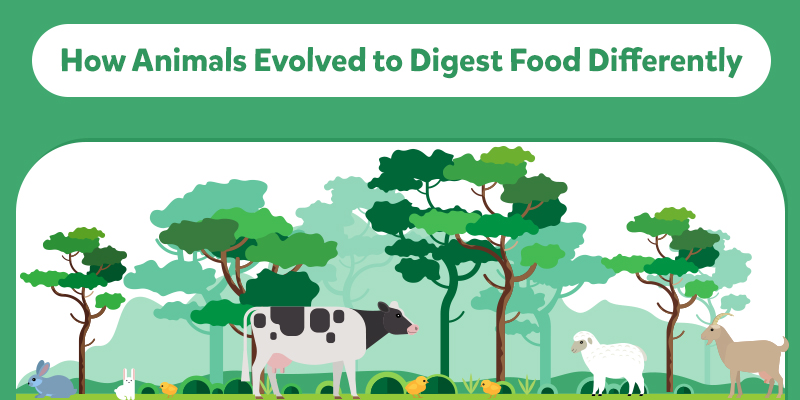
The food we eat travels through our digestive system to help us absorb the nutrition our body needs to function. But a large part of the way our digestive system works depends on the kind of food that we humans eat. Even though the cuisines and tastes we all enjoy vary vastly, the very nature of our food remains largely the same. But have you ever wondered about animals who eat food vastly different from us? What does their digestive system look like? And more importantly, why do some animals have much larger intestines as part of their digestive system than others?
Let’s look at the science behind how food dictates the type of digestive system an animal has.
To understand an animal’s digestive system, we must first understand the food they eat. There are three major classifications of animals based on the kind of food they eat – namely herbivores, carnivores and omnivores. Herbivores are those animals that eat plants for their source of nutrition. They usually don’t consume any other type of food. They are further classified into categories depending on the part of the plant they eat. Frugivores are animals who eat fruits, folivores are animals who eat leaves, nectarivores are animals that feed on nectar and so on.

Herbivores like deer often have flat teeth to help them chew plant matter. (Image: Wikimedia)
Next come carnivores, i.e. animals who eat meat. Carnivores are further classified depending on their level of meat consumption. Hypercarnivores have diets almost completely made up of meat. Large jungle cats like lions and tigers fall in this category. Mesocarnivores are those animals with half their diet made up of meat. These animals may also eat fruits and berries. Foxes and racoons fall in this category. Hypocarnivores are those animals that eat the least amount of meat. Their diet is made up of a combination of meat and berries, fruits, nuts and other plant products. Bears are an example of hypocarnivores. By some classifications, hypocarnivores are also called omnivores i.e. animals that eat both meat and plants as part of their diet.

Carnivores like lions often have sharp teeth to help them tear the flesh of their prey. (Image: Wikimedia)
All these animals, with their varying diets, form a part of the food chain in an ecosystem. The existence of each type of animal is important for the food chain to stay intact.
Among the digestive systems of all these animals, herbivores have something that sets them apart – they have longer intestines compared to carnivores! The reason? Their diets. These plant-eating creatures have a difficult time digesting the food they consume. Cellulose, a substance found in plant cells, is particularly difficult to digest. Hence herbivores have longer intestines so that their digestive systems get the time to break down and absorb all the nutrients from the plant matter they consume. In fact, a herbivore’s intestines could be as long as ten times their body length!

The African elephant is the world’s largest herbivore. (Image: Wikimedia)
Carnivores on the other hand have shorter intestines because the difficult job of digesting cellulose is also done by the herbivores they eat!
The differences however don’t just end there. Herbivores also have more complex digestive systems with multiple chambers as opposed to a single chamber digestive system seen in carnivores and even humans.
Biology, the study of living things, looks at more interesting information on anatomy like these. However, the best way to understand it would be to see what you are learning right in front of you. BYJU’S learning programs have visually rich videos that can help you with this. To book a free trial class with BYJU’S click here.
Ruminants are herbivores that have multiple chambers in their stomachs. The multiple chambers help the animal break down the plant matter they consume as food. The interesting quality of a ruminant’s digestive system is regurgitation i.e bringing back swallowed food into the mouth again. When ruminants like goats, sheep and cows eat grass, they regurgitate their partially digested food (called cud) and chew it again. When the cud is swallowed it moves to the next chamber in the stomach where it is further broken down, regurgitated again and the cycle is repeated till the food moves to the last chamber of the stomach.

Cows are ruminants. (Image: Wikimedia)
The largest and first stomach chamber of ruminants is called the rumen and has bacteria that help the animal break down the food they eat. If you’ve ever seen cows chewing for long hours in a day, now you know why!
Interestingly, although they may appear to be so, horses are not ruminants! Despite eating a diet largely consisting of plant matter, they do not have multiple chambers in their stomach. Instead, their long intestines help them break down cellulose similar to how a rumen would help a cow.
What other features of an animal are affected by the food they consume? Can you guess? Tell us in the comments below.
Did you enjoy reading this? Check out more like this from The Learning Tree Blog:
Why do fish die when taken out of water?
Deepthi is an ambivert who is on a steady diet of good food, filter coffee, and self-improvement. Being an ardent reader, storytelling has been her first love and she enjoys exploring how to convey stories compellingly. Having studied psychology and experienced the learning and development field, Deepthi is driven to understand human behavior and to know what makes each of us unique. You are most likely to find her tucked into a cozy corner at a local cafe with a Kindle or a book in hand. If you find her there, stop by and say hello, she'd be eager to learn your story too. Until then, you can ping her at storyweavers@byjus.com for anything you may like to share.
Comments
Josly Jose
September 18, 2021
I will study for the animal life
Thanks byjus I will study for this